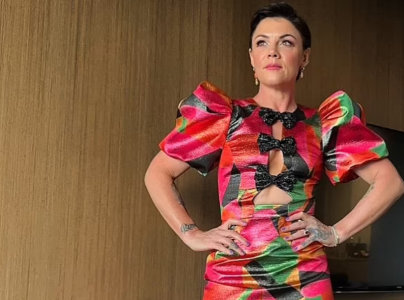Public figure slams TV program over controversial ADHD story
By
Gian T
- Replies 45
Em Rusciano, known for speaking her mind, is once again in the spotlight—this time for calling out a high-profile program over its handling of a sensitive topic close to her heart.
If you’ve ever questioned how certain subjects are portrayed in the media, this bold response is adding fuel to a growing conversation.
For those who may not know, Em Rusciano, 46, is not just a celebrated comedian, podcaster, and former Project panellist—she’s also been open about her own ADHD diagnosis, which she received four years ago.
Her lived experience provides her with a unique perspective on how the media portrays neurodivergent individuals, and she has become a passionate advocate for the community.
So when The Project aired a segment focusing on the alleged 'overprescription' of ADHD medication—featuring Professor Ian Hickie from the University of Sydney’s Brain and Mind Centre—Em was quick to call out what she saw as a harmful narrative.
The segment raised concerns about rising ADHD diagnoses and questioned whether medication is being prescribed appropriately, especially for teenagers.
Professor Hickie’s comments, while perhaps well-intentioned, struck a nerve with many in the neurodivergent community.
'We should really worry about inappropriate prescribing,' he said, highlighting the increase in diagnoses and questioning whether those receiving medication are truly the ones in need.
Em didn’t hold back. Taking to Instagram, she reposted her comment from The Project’s social media, writing:
'Why does The Project continue to target the ND (neurodivergent) community with these s****, clickbait, and frankly dehumanising segments?' She finished with a blunt, 'Actually, get f*****.'
It’s not the first time Em has called out her former employers for what she sees as a lack of sensitivity or understanding.
She was a regular on The Project from 2011 to 2022, and her history with the show gives her criticism extra weight.
This isn’t an isolated incident. Em has a track record of challenging the media when she feels it’s failed to support marginalised groups.
She previously criticised The Project for its handling of comedian Reuben Kaye’s controversial joke, suggesting the show distanced itself from him only after public backlash.
She’s also taken aim at Triple M, another former employer, after host Marty Sheargold made disparaging comments about the Matildas, Australia’s beloved women’s soccer team.
Em recounted her own experiences with misogyny at the station, recalling a meeting where she was told, 'Unless you have a c*** and b****, I don’t care about your opinion.'
According to Em, this wasn’t a one-off comment but a sentiment repeated in team meetings.
Her willingness to speak out has made her a champion for many who feel voiceless in the face of entrenched attitudes in the media industry.
Em’s outrage isn’t just about one segment—it’s about a broader pattern in how neurodivergent people are portrayed.
Too often, stories about ADHD and other conditions focus on 'problems' and 'risks' rather than the lived experiences of those affected.
This can lead to stigma, misunderstanding, and even barriers to diagnosis and treatment for those who need it.
For many Australians—especially those over 60 who may have grown up in an era when neurodiversity was poorly understood—these conversations are vital.
ADHD isn’t just a childhood condition, and it’s not a 'fad' diagnosis. Many adults are only now discovering that their lifelong struggles have a name and that support is available.
The debate over ADHD medication is complex. On one hand, there are legitimate concerns about overprescription and the need for careful diagnosis.
On the other, there’s a risk that sensationalist media coverage can discourage people from seeking help or make them feel ashamed of their diagnosis.
For older Australians, this is especially relevant. Many in our community may have gone undiagnosed for decades, only to receive answers later in life.
The last thing anyone needs is to feel judged or dismissed by the media.
Em’s passionate response is a reminder that we need more nuanced, compassionate discussions about neurodiversity.
Instead of clickbait and controversy, let’s hear from people with lived experience.
Let’s talk about the challenges—and the strengths—of being neurodivergent. And let’s make sure everyone feels seen, heard, and respected.

Have you or someone you know been affected by ADHD or another neurodivergent condition? How do you feel about the way these topics are covered in the media? Do you think there’s still too much stigma, or are things improving? We’d love to hear your thoughts and experiences—share your story in the comments below.
If you’ve ever questioned how certain subjects are portrayed in the media, this bold response is adding fuel to a growing conversation.
For those who may not know, Em Rusciano, 46, is not just a celebrated comedian, podcaster, and former Project panellist—she’s also been open about her own ADHD diagnosis, which she received four years ago.
Her lived experience provides her with a unique perspective on how the media portrays neurodivergent individuals, and she has become a passionate advocate for the community.
So when The Project aired a segment focusing on the alleged 'overprescription' of ADHD medication—featuring Professor Ian Hickie from the University of Sydney’s Brain and Mind Centre—Em was quick to call out what she saw as a harmful narrative.
The segment raised concerns about rising ADHD diagnoses and questioned whether medication is being prescribed appropriately, especially for teenagers.
Professor Hickie’s comments, while perhaps well-intentioned, struck a nerve with many in the neurodivergent community.
'We should really worry about inappropriate prescribing,' he said, highlighting the increase in diagnoses and questioning whether those receiving medication are truly the ones in need.
Em didn’t hold back. Taking to Instagram, she reposted her comment from The Project’s social media, writing:
'Why does The Project continue to target the ND (neurodivergent) community with these s****, clickbait, and frankly dehumanising segments?' She finished with a blunt, 'Actually, get f*****.'
It’s not the first time Em has called out her former employers for what she sees as a lack of sensitivity or understanding.
She was a regular on The Project from 2011 to 2022, and her history with the show gives her criticism extra weight.
This isn’t an isolated incident. Em has a track record of challenging the media when she feels it’s failed to support marginalised groups.
She previously criticised The Project for its handling of comedian Reuben Kaye’s controversial joke, suggesting the show distanced itself from him only after public backlash.
Em recounted her own experiences with misogyny at the station, recalling a meeting where she was told, 'Unless you have a c*** and b****, I don’t care about your opinion.'
According to Em, this wasn’t a one-off comment but a sentiment repeated in team meetings.
Her willingness to speak out has made her a champion for many who feel voiceless in the face of entrenched attitudes in the media industry.
Em’s outrage isn’t just about one segment—it’s about a broader pattern in how neurodivergent people are portrayed.
Too often, stories about ADHD and other conditions focus on 'problems' and 'risks' rather than the lived experiences of those affected.
For many Australians—especially those over 60 who may have grown up in an era when neurodiversity was poorly understood—these conversations are vital.
ADHD isn’t just a childhood condition, and it’s not a 'fad' diagnosis. Many adults are only now discovering that their lifelong struggles have a name and that support is available.
The debate over ADHD medication is complex. On one hand, there are legitimate concerns about overprescription and the need for careful diagnosis.
On the other, there’s a risk that sensationalist media coverage can discourage people from seeking help or make them feel ashamed of their diagnosis.
For older Australians, this is especially relevant. Many in our community may have gone undiagnosed for decades, only to receive answers later in life.
Em’s passionate response is a reminder that we need more nuanced, compassionate discussions about neurodiversity.
Instead of clickbait and controversy, let’s hear from people with lived experience.
Let’s talk about the challenges—and the strengths—of being neurodivergent. And let’s make sure everyone feels seen, heard, and respected.
Key Takeaways
- Em Rusciano has criticised The Project for a segment she described as 'dehumanising' towards the neurodivergent community, particularly regarding ADHD and the alleged over-prescription of medication.
- Rusciano, who was a regular panellist on The Project from 2011 to 2022 and has ADHD herself, took aim at the show on Instagram, accusing it of targeting neurodivergent people with negative coverage.
- She has also spoken out about misogyny in the Australian media industry, sharing her experiences at Triple M and backing calls for more respect for women in sport and the workplace.
- Rusciano has voiced ongoing frustration at the commercial radio sector, claiming that it favours hosts who show little care for their guests or target audiences compared to independent platforms like her Emsolation podcast.








